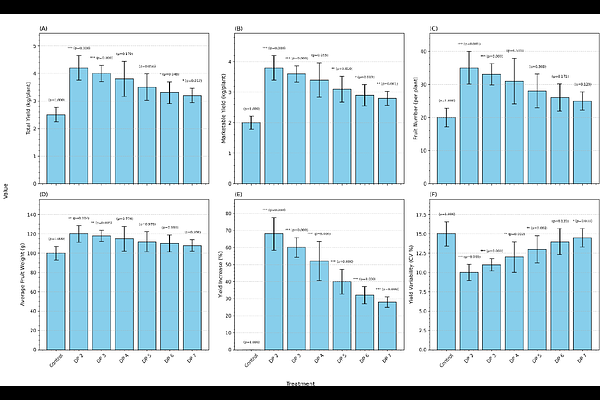The Effects of Alginate Oligosaccharides (AOS) with Degree of Polymerization (DP) 2, 3, 4, 5, 6, and 7 on Tomato Yields

The Effects of Alginate Oligosaccharides (AOS) with Degree of Polymerization (DP) 2, 3, 4, 5, 6, and 7 on Tomato Yields
Chi, Y.; Wang, X.; Zhang, Z.
AbstractThis study evaluated the effects of alginate oligosaccharide (AOS) fractions with degrees of polymerization (DP) 2-7 on tomato (Solanum lycopersicum L.) growth, yield, fruit quality, physiology, nutrient uptake, and defense responses under greenhouse conditions. AOS application significantly enhanced total yield, increasing from 2.5 kg/plant in the control to 4.2 kg and 4.0 g in DP 2 and DP 3, respectively (p<0.001). Marketable yield, fruit number, and average fruit weight also improved, with the highest values observed in DP 2 and DP 3 treatments. Fruit quality parameters, including total soluble solids (6.2 {degrees}Brix) and lycopene content (4.8 mg/100g), were significantly higher in these groups. Plant growth metrics, such as height (70 cm), leaf number (25 leaves), and biomass accumulation, were markedly increased. Physiological traits, including photosynthetic rate (18.5 mol CO 2 m-2 s-1), chlorophyll content, and stomatal conductance, were also enhanced. Nutrient uptake of nitrogen, phosphorus, and potassium, as well as antioxidant enzyme activities (PAL, peroxidase, catalase, and SOD), were significantly elevated, while malondialdehyde (MDA) content was reduced. These findings suggest that AOS, particularly DP 2 and DP 3, effectively promote tomato productivity, fruit quality, and stress tolerance through improved physiological performance and defense activation.